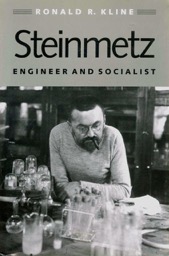 $9.99 on Kindle
$9.99 on KindleSteinmetz: Engineer and Socialist by Ronald Kline (159,000 words, 10 illustrations): this eBook edition is by arrangement with Johns Hopkins University Press
When Charles Proteus Steinmetz (1865-1923) died suddenly at the height of his fame, his face was as familiar to Americans as that of Babe Ruth, Henry Ford, or Jack Dempsey. Newspapers quoted his views on religion, politics (he was a Socialist), science, and future technological wonders. All were intrigued by the Horatio Alger tale of the penniless, hunchbacked German immigrant who rose to fame as the Wizard of Science, chief engineer at General Electric, and symbol of the new breed of scientists who daily surpassed the feats of Thomas Alva Edison.
This intellectual biography follows Steinmetz from his education in Germany to his rise as General Electric’s chief consulting engineer. Steinmetz obtained nearly 200 patents; he made his most important contributions in electrical energy loss (or hysteresis), the understanding and wider use of alternating current, and high-voltage power transmission. General Electric became Steinmetz’s home, his identity, and a platform from which he stepped onto the wider stage of world affairs. As leader of the American Institute of Electrical Engineers, Socialist councilman in Schenectady, New York, and part-time professor at Union College, Steinmetz attempted to “engineer” society in the direction of a technocratic utopia by promoting welfare capitalism, Lenin’s electrification of the Soviet Union, and other schemes — all with limited success. In a life filled with contrasts, perhaps even Steinmetz himself, a prominent Socialist serving as chief engineer of a major corporation, was not always able to separate the myth from the man.
Steinmetz: Engineer and Socialist was the subject of the 2014 PBS documentary film, “Divine Discontent.”
“Well informed by recent studies of similar mythologizing, Kline explains both the rise and decline of Steinmetz’s popular reputation.” — Robert Friedel, Science
“Kline’s explanations are lucid and he offers broader insights about science and technology that will interest all cultural historians.” — Mark Pittenger, Journal of American History
“Steinmetz not only provides the first comprehensive, technically sophisticated analysis of Steinmetz’s engineering achievements, but also carefully examines his influential political and social writings, and judiciously dissects the making of the ‘Wizard of Schenectady’ legend.” — David Sicilia, Reviews in American History



